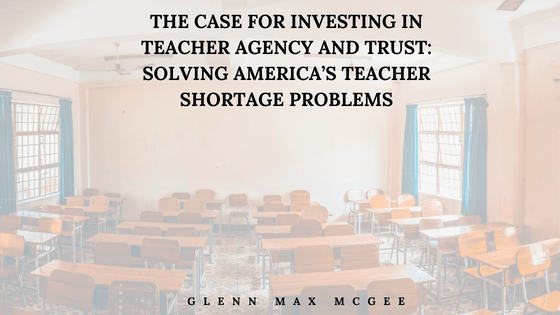The Case for Investing in Teacher Agency and Trust:
Solving America’s Teacher Shortage Problems
Providing teachers more control over classroom decisions is more financially effective and efficient than trying to boost teacher salaries by cutting positions and raising class sizes.
By Glenn “Max” McGee, President
Hazard, Young, Attea, and Associates
Jamie Rosenberg, CEO
ClassWallet
If a teacher were choosing employment between two districts and District A gave each teacher a classroom budgeting tool that contained funds for supplies, easy access to crowdfunding tools, additional funding that may originate from federal or local grants or PTA, and District B did not, what district do you think the teacher will choose to work for? Which “walks the talk” of trusting teachers? Which will have higher morale and higher teacher retention?
“A change in trust in management of just one-third of a standard deviation [~10%] has the same life satisfaction effect as a 31% change in income,” or as Covey, Link, and Merrill summarize in The Speed of Trust: “A 10% increase in trust has the same effect as a 30% increase in pay. ” With the financial challenges facing school districts in every state across the country, investing in trust makes sound financial sense and more importantly is likely to increase teacher retention rate and be a competitive advantage for recruitment.
Teachers seek out districts and schools where faculty are trusted, respected, and appreciated. With the ever-increasing demands for accountability, following a common core curriculum, local and state mandates, teacher autonomy is a rare commodity. Yet giving teachers autonomy and agency over instructional decisions is arguably the most effective way for administrators and board members to let teachers know they are trusted, respected, and appreciated.
Nationwide, districts are plagued by teacher shortages. Linda Darling-Hammond and her team at the Learning Policy Institute have researched the reasons teacher leave the profession and cite “lack of support for new teachers and challenging working conditions” as two of the top five reasons. Some examples of challenging working conditions include relationships with principals, overwhelming demands related to school accountability and assessment measures, and lack of opportunities to collaborate with colleagues.
Poor compensation is a third reason, a problem compounded by the fact that teachers often spend several hundred dollars a year out of their own pocket for materials, supplies, and student incentives. Moreover, if teachers are fortunate enough to be reimbursed for some purchases, they usually must keep track of paper receipts, identify budget codes, submit them with a form and then wait at least a month for formal approval before receiving their reimbursement.
School districts should invest in trust by creating conditions and taking tangible, purposeful measures that actually “walked the talk” of respecting, valuing, and appreciating teachers that they could not only enhance morale and improve their school climate measures but also increase teacher retention, attract the best new teachers as well as veterans from other districts, and thus improve student achievement.
Moreover, investing in ameliorating challenging working conditions and supporting teachers by providing more control over classroom decisions and more opportunities to take charge of their own instructional time, as well as the ability to make purchases without bureaucratic red tape or cutting into their own limited compensation will be far more financially effective and efficient than trying to find ways to boost teacher salaries as any significant increase in salary will have hidden costs to teachers in terms of job cuts, larger class sizes, and less support.
Hazard, Young, Attea, and Associates (HYA) to work more deeply with districts interested in boosting recruitment efforts and teacher retention through leadership selection and development and district planning and analytics. HYA retains a network of more than 100 invited, expert independent consultants to assist and support districts striving to improve their climate, culture, and governance conditions to optimize teaching and learning. ClassWallet uniquely enables districts to provide teachers more trust and purchasing decision power, while affording the district business office the quality control it needs, with much less bureaucracy and paperwork.
Reference:
Helliwell, John F. and Huang, Haifant (2008) “Well-being and trust in the workplace” NATIONAL BUREAU OF ECONOMIC RESEARCH 1050 Massachusetts Avenue Cambridge, MA. NBER WORKING PAPER 14589 http://www.nber.org/papers/w14589

